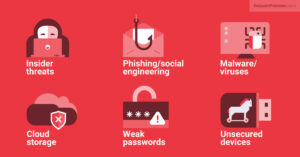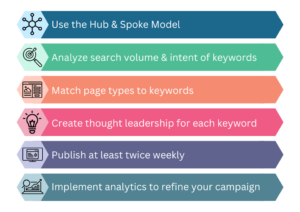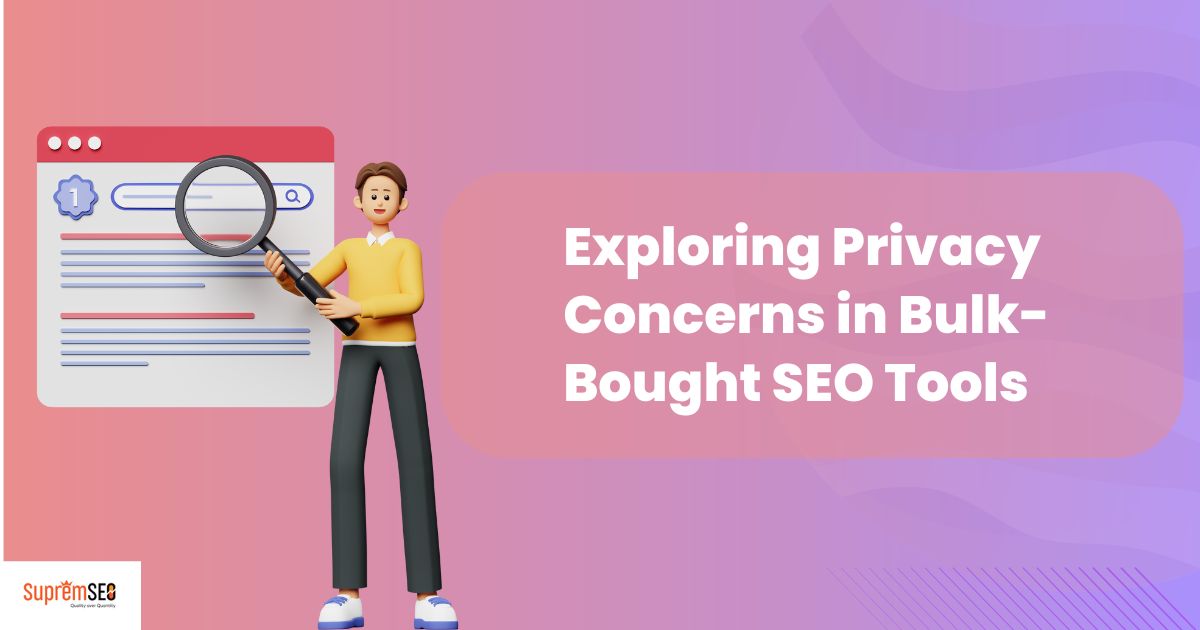In today’s digital age, businesses are increasingly relying on search engine optimization tools to improve their online presence. These tools can help businesses identify keywords, optimize content, and track website traffic. However, with the rise of data breaches and privacy concerns, there is growing skepticism about the use of bulk-bought SEO tools.

Privacy is a major concern for businesses that use SEO tools because these tools often collect and store sensitive information about website visitors, impacting user experience. This information can include IP addresses, search history, and personal details like name and email address. If this information falls into the wrong hands, it can be used for malicious purposes like identity theft or phishing scams. Therefore, businesses should be aware of the privacy policies of the SEO tools they use and take steps to protect their customers’ data.
Exploring privacy concerns in bulk-bought SEO tools can help businesses make informed decisions about the tools they use. By understanding the risks and benefits of different technical SEO tools, businesses can choose tools that prioritize privacy and security. This article will delve into the privacy concerns surrounding bulk-bought SEO tools and provide tips for small businesses to protect their data and their customers’ data.
Assessing the Risks of Bulk-Bought SEO Tools

Bulk-purchased SEO tools can provide businesses with a cost-effective way to get access to multiple SEO tools like tools. However, it is important to assess the risks associated with these tools before making a purchase. In this section, we will explore the key factors that business owners should consider when assessing the risks of bulk-purchased SEO tools.
Data Privacy and Security Concerns

One of the most significant risks associated with bulk-purchased SEO tools is data privacy and security. When using these tools, business owners must ensure that their data is safe from online threats such as hacking, data breaches, and cyber attacks. To mitigate these risks, businesses should use strong passwords, enable two-factor authentication, and ensure that their privacy settings are set to the highest level possible.
Understanding the Implications of Shared SEO Tools
Sharing SEO tools through a group buy service can raise significant data privacy concerns. By granting access to these tools to multiple users, there is a risk that sensitive SEO data, such as keyword strategies, analytics reports, and backlink information, could be accessed by others. To prevent this, businesses should use virtual private networks (VPNs) and ensure that their data is encrypted.
Mitigating Potential Threats to User Privacy
To mitigate potential threats to user privacy, businesses should ensure that their SEO tools are compliant with relevant data protection regulations. This includes data minimization, which means that only the minimum amount of data necessary should be collected and processed. Additionally, businesses should ensure that their SEO tools have user-friendly privacy settings and that their privacy policies are clear and concise.
Strategic Use of SEO Tools While Protecting Privacy

With the increasing importance of SEO in digital marketing, SEO tools have become an essential component of any SEO strategy. However, as these tools often require access to sensitive data, privacy concerns have also become a major issue. In this section, we will explore how to strategically use SEO tools while protecting privacy.
| Action | Explanation |
|---|---|
| Use HTTPS-enabled sites | Secure sites with HTTPS to protect data transferred between your site and users. |
| Limit access to sensitive data | Restrict who can see important data to keep it safe. |
| Anonymize data | Change details in the data so you can’t tell who it’s about, keeping user identities safe. |
| Regular SEO audits | Check your SEO regularly to find and fix any privacy issues. |
| Use robots.txt files | Use this file to control what search engines can see and index on your site. |
| Follow SEO-friendly practices | Use tags and avoid mistakes that hurt your site’s visibility and privacy in search engines. |
Incorporating Privacy Measures in SEO Strategies
When developing an SEO strategy, it is important to consider privacy concerns and incorporate privacy measures. This includes using tools that have strong privacy policies, limiting access to sensitive data, and anonymizing data whenever possible. In addition, website owners should ensure that their sites are HTTPS-enabled and have a robots.txt file to control what search engines can crawl.
Best Practices for Privacy-Conscious SEO

To ensure that SEO efforts are privacy-conscious, it is important to follow best practices. This includes conducting regular SEO audits to identify any privacy concerns, such as broken links or duplicate content. It also involves using SEO-friendly tags and avoiding errors that may negatively impact search engine rankings.
Leveraging SEO Tools for Maximum Benefit and Minimum Risk
SEO tools offer a range of features that can help improve website visibility, traffic, and search engine rankings. Popular tools such as Google Analytics, Google Search Console, Ahrefs, SEMrush, and Screaming Frog can provide valuable insights into website performance, backlinks, and keyword research. However, it is important to use these tools with caution and ensure that they are not compromising privacy.
To leverage good SEO tools for maximum benefit and minimum risk, website owners should consider the following:
- Use tools that have strong privacy policies and data protection measures
- Limit access to sensitive data and anonymize data whenever possible
- Conduct regular SEO audits to identify and address privacy concerns
- Use HTTPS-enabled sites with robots.txt files to control what search engines can crawl
- Use SEO-friendly tags and avoid errors that may negatively impact search engine rankings
- Consider hiring an agency that specializes in privacy-conscious SEO to ensure that all best practices are being followed
Frequently Asked Questions
What are the potential risks associated with using third-party SEO tools?
Third-party SEO tools can pose a risk to user privacy and data security. These tools may collect sensitive information such as website traffic, search queries, and user behavior. In some cases, these tools may also share this information with third-party companies for marketing or other purposes. Users should carefully review the privacy policies of these tools to understand the data collection and sharing practices.
How can I ensure the security of my data when using shared SEO tools?
Users can take several steps to ensure the security of their data when using shared SEO tools. First, they should choose a reputable provider with a track record of protecting user privacy. Second, they should use strong passwords and two-factor authentication to secure their accounts. Finally, they should monitor their accounts regularly for any suspicious activity.
What should I consider before purchasing SEO tools from a bulk provider?
Before purchasing SEO tools from a bulk provider, users should consider several factors. First, they should evaluate the reputation and track record of the provider. Second, they should review the features and functionality of the tools to ensure they meet their needs. Finally, they should consider the cost of the tools and whether they offer good value for money.
How does the use of group buy SEO tools impact data privacy?
The use of group buy SEO tools can impact data privacy in several ways. First, users may be sharing their data with other users of the same tools. Second, these tools may not have the same level of security and privacy protections as individual licenses. Users should carefully review the terms of service and privacy policies of these tools before using them.
Can the use of shared SEO tools lead to a compromise in competitive advantage?
The use of shared SEO tools may lead to a compromise in competitive advantage if other users of the same tools have access to the same data and insights. Users should carefully consider the risks and benefits of using shared SEO tools and whether they are willing to accept the potential loss of competitive advantage.
What measures do SEO tool providers take to protect user privacy?
SEO tool providers take several measures to protect user privacy. These measures include data encryption, two-factor authentication, and regular security audits. Providers may also have strict data handling policies and procedures. These prevent unauthorized access or sharing of user data. Users should review the privacy policies and security measures of SEO tool providers before using their services.










